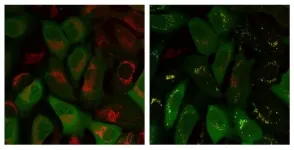A drug that can stop tumors from growing
CU Cancer Center research shows that inhibiting NLRP3 can reduce inflammation in melanoma cells.
2021-04-07
(Press-News.org) Cancer doctors may soon have a new tool for treating melanoma and other types of cancer, thanks to work being done by researchers at the University of Colorado Cancer Center.
In a paper published in the journal PNAS last month, CU Cancer Center members Mayumi Fujita, MD, PhD, Angelo D'Alessandro, PhD, Morkos Henen, PhD, MS, Beat Vogeli, PhD, Eric Pietras, PhD, James DeGregori, PhD, Carlo Marchetti, PhD, and Charles Dinarello, MD, along with Isak Tengesdal, MS, a graduate student in the Division of Infectious Diseases at the University of Colorado School of Medicine, detail their work on NLRP3, an intracellular complex that has been found to participate in melanoma-mediated inflammation, leading to tumor growth and progression. By inhibiting NLRP3, the researchers found, they can reduce inflammation and the resultant tumor expansion.
Specifically, NLRP3 promotes inflammation by inducing the maturation and release of interleukin-1-beta, a cytokine that causes inflammation as part of the normal immune response to infection. In cancer, however, inflammation can cause tumors to grow and spread.
"NLRP3 is a member of a larger family that is involved in sensing danger signals," Marchetti says. "It is a receptor that surveils the intercellular compartment of a cell, looking for danger molecules or pathogens. When NLRP3 recognizes these signals, it leads to the activation of caspase-1, a protein involved in the processing and maturation of interleukin-1-beta into its biological active form, causing an intense inflammatory response. We found that in melanoma, this process is dysregulated, resulting in tumor growth."
The oral NLRP3 inhibitor used in their study (Dapansutrile) has already shown to be effective in clinical trials to treat gout and heart disease, and it is currently being tested in COVID-19 as well. The CU cancer researchers are now trying to find out if this NLRP3 inhibitor can be successfully used in melanoma patients who are resistant to checkpoint inhibitors.
"Checkpoint inhibitors increase the efficacy of the immune system to kill tumors, but sometimes tumors become resistant to this treatment," Marchetti says. "A big part of cancer research now is to find therapies that can be combined with checkpoint inhibitors to improve their efficacy."
With the hypothesis that an NLRP3 inhibitor is one of those therapies, CU Cancer Center researchers are studying the drug's effects on melanoma, as well as breast cancer and pancreatic cancer. In addition to improving the immune response, the NLRP3 inhibitor can also help reduce the side effects of checkpoint inhibitors. Marchetti says this research can make a big difference for melanoma patients who don't respond to checkpoint inhibitors alone.
"This was a very collaborative project that involved a lot of members of the university, and we are very excited about it," he says. This project is important because it further shows that NLRP3-mediated inflammation plays a critical role in the progression of melanoma, and it opens new strategies to improve patient care."
INFORMATION:
ELSE PRESS RELEASES FROM THIS DATE:
2021-04-07
ZANZIBAR CITY (April 7, 2021) - A new study revealed that a drastic reduction of deaths of one of Africa's rarest primates, the Zanzibar red colobus (Piliocolobus kirkii), followed the installation of four speedbumps along a stretch of road where the species frequently crossed.
Zanzibar red colobus are found only in the Zanzibar archipelago and classified as Endangered by the IUCN Red List. Reliant on Unguja Island's forests for their survival, around half of the species population is found in Jozani-Chwaka Bay National Park.
In the study, published ...
2021-04-07
Eight months after mild COVID-19, one in ten people still has at least one moderate to severe symptom that is perceived as having a negative impact on their work, social or home life. The most common long-term symptoms are a loss of smell and taste and fatigue. This is according to a study published in the journal JAMA, conducted by researchers at Danderyd Hospital and Karolinska Institutet in Sweden.
Since spring 2020, researchers at Danderyd Hospital and Karolinska Institutet have conducted the so-called COMMUNITY study, with the main purpose of examining immunity after COVID-19. In the first phase of the study in spring 2020, blood samples were collected from 2,149 employees at Danderyd Hospital, of whom about 19 percent had antibodies against SARS-CoV-2. Blood samples have since ...
2021-04-07
With a lethal, airborne virus spreading fast, hospitals had to change how they treated patients and policies for how caregivers provided that treatment. But for maternity patients and nurses some of those changes had negative outcomes, according to a new University of Washington study.
"We found that visitor restrictions and separation policies were harming families and nurses. The effects for patients included loneliness, isolation and mistrust, while nurses described mistrust and low morale," said Molly Altman, lead author of the study and assistant professor in the UW School of Nursing.
Importantly, Altman added, both nurses and patients described how COVID "amplified existing ...
2021-04-07
LA JOLLA--(April 7, 2021) When cells are stressed, chemical alarms go off, setting in motion a flurry of activity that protects the cell's most important players. During the rush, a protein called Parkin hurries to protect the mitochondria, the power stations that generate energy for the cell. Now Salk researchers have discovered a direct link between a master sensor of cell stress and Parkin itself. The same pathway is also tied to type 2 diabetes and cancer, which could open a new avenue for treating all three diseases.
"Our findings represent the earliest step in Parkin's alarm response that anyone's ever found by a long shot. ...
2021-04-07
New medicines for people who have diabetes seem to pop up all the time. Drugs that help the body break down carbohydrates, drugs that increase excretion of glucose in the urine, drugs that help muscles respond to insulin and drugs that stimulate the pancreas to produce it -- the list of pharmaceutical options to treat diabetes gets longer and longer.
The downside of this wealth of treatment options is that it can be difficult for health care providers to stay on top of the latest research and standards of care. Which medication is best for which patients? And what are the best medicines to prescribe that both lower blood glucose and reduce risk for cardiovascular disease?
Johns Hopkins Medicine endocrinologist ...
2021-04-07
How many species of birds are there in the world? It depends on whose count you go by. The number could be as low as 10,000 or as high as 18,000. It's tough to standardize lists of species because the concept of a "species" itself is a little bit fuzzy.
That matters because conserving biodiversity requires knowing what diversity exists in the first place. So biologists, led by University of Utah doctoral candidate Monte Neate-Clegg of the School of Biological Sciences, set out to compare four main lists of bird species worldwide to find out how the lists differ--and why. They found that although the lists agree on most birds, disagreements in some regions ...
2021-04-07
A new analysis of lung epithelial cells from COVID-19 patients reveals how the protective complement branch of the immune system, which usually plays roles in both innate and adaptive immunity, can convert to a harmful system during COVID-19. Blocking excessive complement activity in lung epithelial cells with a combination of existing chemotherapy and antiviral medications - ruxolitinib and remdesivir, respectively - helped normalize the production of complement proteins by infected lung epithelial cells in human cell culture experiments, the researchers found. Thus, the drug duo could serve as a promising strategy to treat damaging inflammation during severe COVID-19, the authors say. Overactivation of complement proteins can contribute to diseases such as acute respiratory distress ...
2021-04-07
HERSHEY, Pa.-- Social distancing and lockdowns may have reduced the spread of COVID-19, but researchers from Penn State College of Medicine also report those actions may have affected clinical researchers' ability to finish trials. Study completion rates dropped worldwide between 13% and 23%, depending on the type of research sponsor and geographic location, between April and October 2020.
Researchers previously reported that more than 80% of clinical trials suspended between March 1 and April 26, 2020, noted the pandemic as their chief reason for halting activity. Patient enrollment in studies was lower in April 2020, compared to April ...
2021-04-07
WYOMISSING, Pa. -- Teaching people to become entrepreneurs requires more than just passing on entrepreneurial skills, according to a team of Penn State Berks-led researchers. Would-be entrepreneurs also need to understand -- and negotiate -- the barriers that they might face.
In a study, researchers built a multidimensional model to measure the effectiveness of entrepreneurship education. The model not only includes teaching entrepreneurial skills, but also addresses the students' intentions to start a business and their perceptions of the barriers they might encounter when starting a business.
"There are a lot of studies in the literature that focus on, for example, how entrepreneurship education ...
2021-04-07
HOUSTON -- (April 7, 2021) -- Rice University computer scientists have demonstrated artificial intelligence (AI) software that runs on commodity processors and trains deep neural networks 15 times faster than platforms based on graphics processors.
"The cost of training is the actual bottleneck in AI," said Anshumali Shrivastava, an assistant professor of computer science at Rice's Brown School of Engineering. "Companies are spending millions of dollars a week just to train and fine-tune their AI workloads."
Shrivastava and collaborators from Rice and Intel will present research that addresses that bottleneck April 8 at the machine learning systems conference MLSys.
Deep neural networks ...
LAST 30 PRESS RELEASES:
[Press-News.org] A drug that can stop tumors from growing
CU Cancer Center research shows that inhibiting NLRP3 can reduce inflammation in melanoma cells.




